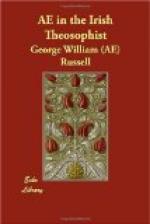So this Isle, once called the Sacred Isle and also the Isle of Destiny, may find a destiny worthy of fulfilment: not to be a petty peasant republic, nor a miniature duplicate in life and aims of great material empires, but that its children out of their faith, which has never failed may realise this imemorial truth of man’s inmost divinity, and in expressing it may ray the light over every land. Now, although a great literature and great thought may be part of our future, it ought not to be the essential part of our ideal. As in our past the bards gave way before the heroes, so in any national ideal worthy the name, all must give way in its hopes, wealth, literature, art, everything before manhood itself. If our humanity fails us or become degraded, of what value are the rest? What use would it be to you or to me if our ships sailed on every sea and our wealth rivaled the antique Ind, if we ourselves were unchanged, had no more kingly consciousness of life, nor that overtopping grandeur of soul indifferent whether it dwells in a palace or a cottage?
If this be not clear to the intuition, there is the experience of the world and the example of many nations. Let us take the highest, and consider what have a thousand years of empire brought to England. Wealth without parallel, but at what expense! The lover of his kind must feel as if a knife were entering his heart when he looks at those black centres of boasted prosperity, at factory, smoke and mine, the arid life and spiritual death. Do you call those miserable myriads a humanity? We look at those people in despair and pity. Where is the ancient image of divinity in man’s face: where in man’s heart the prompting of the divine? There is nothing but a ceaseless energy without; a night terrible as hell within. Is this the only way for us as a people? Is nature to be lost; beauty to be swallowed up? The crown and sceptre were taken from us in the past, our path has been strewn with sorrows, but the spirit shall not be taken until it becomes as clay, and man forgets that he was born in the divine, and hears no more the call of the great deep in his heart as he bows himself to the dust in his bitter labours. It maddens to think it should be for ever thus, with us and with them, and that man the immortal, man the divine, should sink deeper and deeper into night and ignorance, and know no more of himself than glimmers upon him in the wearied intervals of long routine.
Here we have this hope that nature appeals with her old glamour to many, and there is still the ancient love for the hero. In a land where so many well nigh hopeless causes have found faithful adherents, where there has been so much devotion and sacrifice, where poverty has made itself poorer still for the sake of leader and cause, may we not hope that when an appeal is made to the people to follow still higher ideals, that they will set aside the lower for the higher, that they will not relegate idealism to the




